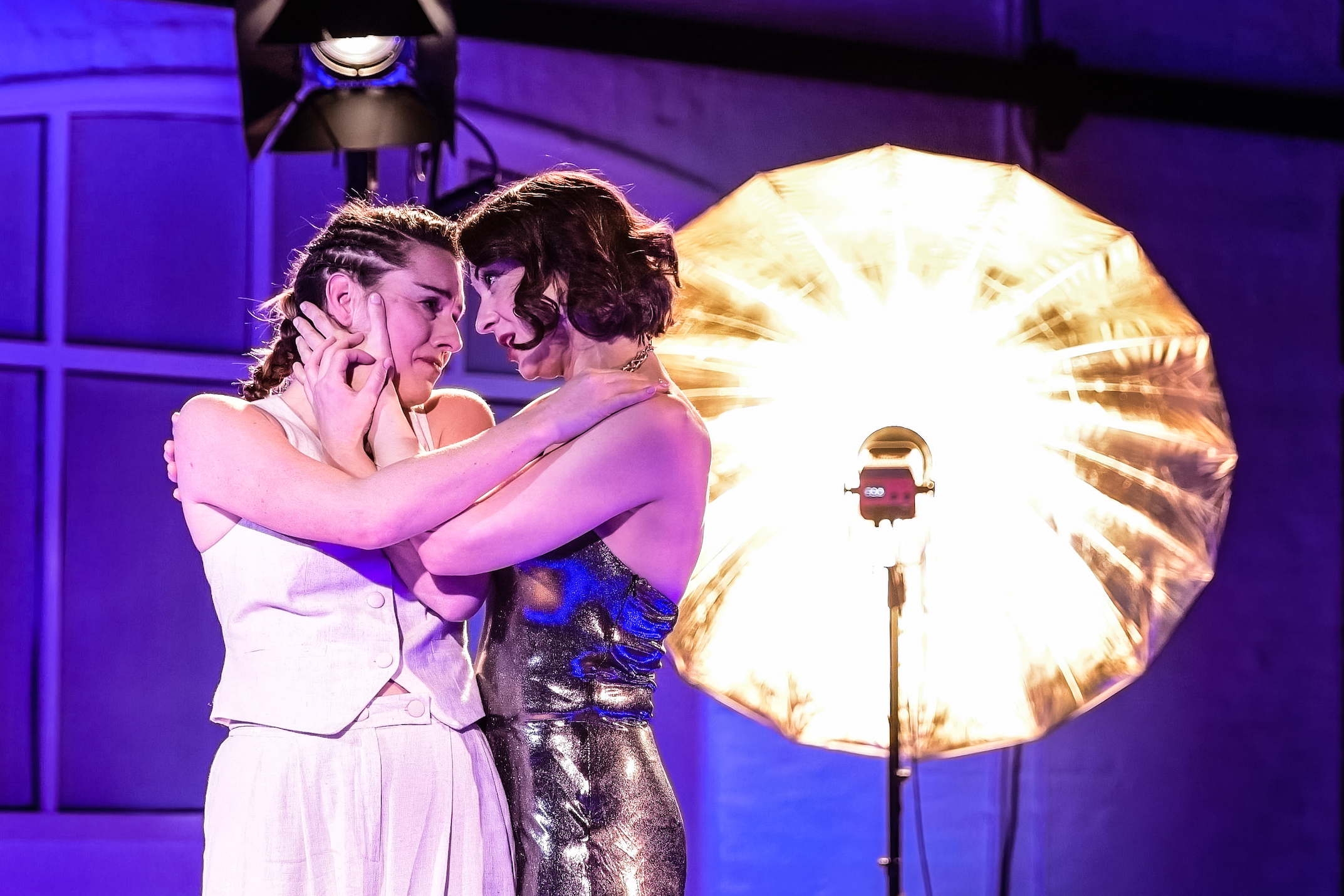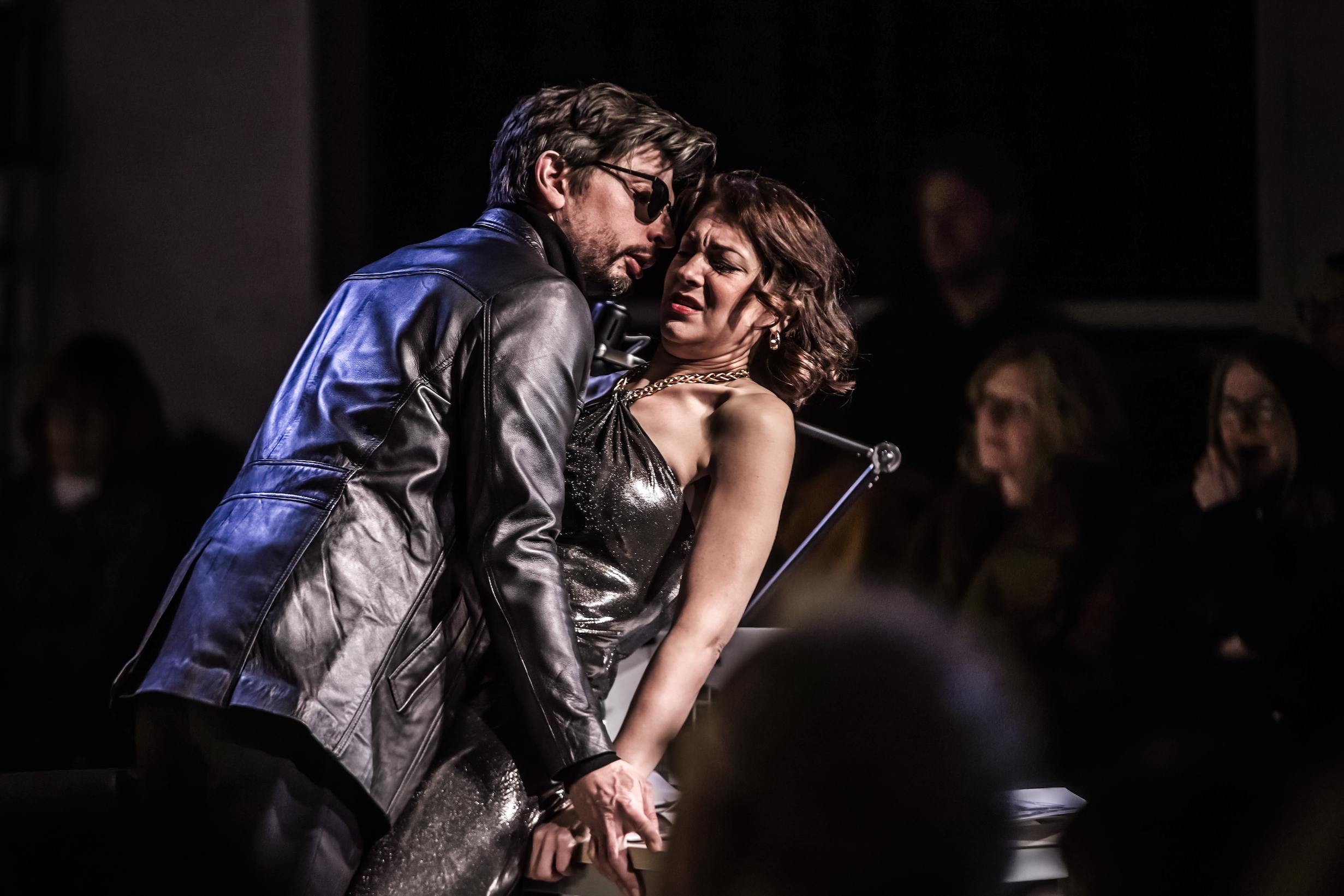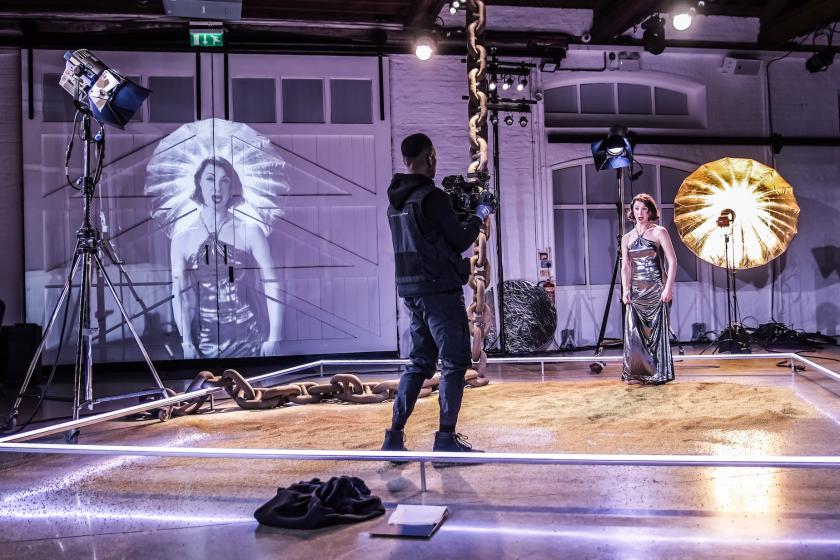“Site-specific” performance locations rarely come more atmospheric, or evocative, than this one. Beyond the East India Dock basin, with the hedgehog-backed dome of the O2 looming just across the Thames on a gusty spring evening, a cavernous “chain store” abuts the Trinity Buoy Lighthouse. For the London Handel Festival, director Jack Furness transforms this haunting (and haunted) chunk of early-Victorian dockland architecture into the studios of “Cyclops Pictures”. Here the renowned (if moody) auteur Paolo Polifemo will rehearse and shoot a film based on Ovid’s story (from the Metamorphoses) of the lovers Aci and Galatea, and the jealous, possessive rage of the giant Polifemo...
The young Handel wrote Aci, Galatea e Polifemo as a “serenata” entertainment to celebrate a grand society wedding in Naples in 1708 (a decade later, with entirely different music, he revived the story for his English masque Acis and Galatea). His first account of the two persecuted lovers and the fatal, violent desire of the wounded cyclops Polifemo deploys limited resources (three principal singers and a compact ensemble of players). But it bursts with richly coloured, intensely involving music that reveals the future operatic master already fully-formed. Furness, musical director Laurence Cummings, the London Handel Orchestra, and three immensely gifted singers, have transmuted this luxury nuptial show composed for one historic port into Aci, by the River – a memorable spectacle mounted amid the industrial relics of another.  Sustaining the elaborate movie-studio conceit occasionally took up too much mental, and visual, bandwidth. However, nothing could detract from the achievement of a trio who made Handel, even at his most courtly and florid, sound not just vocally beautiful but humanly credible: soprano Mary Bevan as Aci, contralto Claudia Huckle as Galatea (pictured above by Craig Fuller on the right with Mary Bevan), and bass Callum Thorpe as Polifemo. Durassie Kiangangu, silently acting and dancing as Polifemo’s assistant director (and, later, Galatea’s slinky temptor), completed a dramatically compelling quartet. Rigged with studio lights, a massive Victorian chain hanging symbolically from the ceiling, the white-walled riverside chamber became a plausible movie stage. The dozen-strong band played in one corner, with spectators seated on three sides, video projections of the action on the fourth, and the huge doors ready to open – at a decisive moment – onto the wind-blown Thames-side waterfront.
Sustaining the elaborate movie-studio conceit occasionally took up too much mental, and visual, bandwidth. However, nothing could detract from the achievement of a trio who made Handel, even at his most courtly and florid, sound not just vocally beautiful but humanly credible: soprano Mary Bevan as Aci, contralto Claudia Huckle as Galatea (pictured above by Craig Fuller on the right with Mary Bevan), and bass Callum Thorpe as Polifemo. Durassie Kiangangu, silently acting and dancing as Polifemo’s assistant director (and, later, Galatea’s slinky temptor), completed a dramatically compelling quartet. Rigged with studio lights, a massive Victorian chain hanging symbolically from the ceiling, the white-walled riverside chamber became a plausible movie stage. The dozen-strong band played in one corner, with spectators seated on three sides, video projections of the action on the fourth, and the huge doors ready to open – at a decisive moment – onto the wind-blown Thames-side waterfront.
Clad in leather and shades, tetchy, tyrannical Thorpe (pictured below) became the entitled maestro of some Cinecittà outfit in the bad old days of unchecked sexual exploitation and outsize creative egos. The drama-within-drama concept, as reality violently intrudes on the film of Aci and Galatea’s love, brought a Fellini or Pirandello touch to the evening. Polifemo, though, turned into a post-#MeToo monster of controlling lust: a Weinstein-era angry sleazebag who takes Galatea’s sexual and artistic subservience as his right and due. Furness, arguably, overegged this fairly straightforward idea, and loaded Thorpe in particular with a little too much voracious villainy, as the saturnine cyclops-director prowled, snarled and simmered his way around the set. The film-studio kit – spotlights, cameras, clapperboards and so on – certainly earned its passage, even if keeping the various props in play led to sometimes superfluous bits of business. Real-time projections, on the wall and separate screens, of the action unfolding in front of us underscored the production’s meta-drama element, if perhaps at a cost of pulling eyes in two directions at once. And bathos could threaten as a mythological libretto that speaks of eagles, talons, thunder, waves, floods, boulders and mountains contended with the more humdrum instruments (from scissors to scripts to coffee cups) of a busy studio at work.
Furness, arguably, overegged this fairly straightforward idea, and loaded Thorpe in particular with a little too much voracious villainy, as the saturnine cyclops-director prowled, snarled and simmered his way around the set. The film-studio kit – spotlights, cameras, clapperboards and so on – certainly earned its passage, even if keeping the various props in play led to sometimes superfluous bits of business. Real-time projections, on the wall and separate screens, of the action unfolding in front of us underscored the production’s meta-drama element, if perhaps at a cost of pulling eyes in two directions at once. And bathos could threaten as a mythological libretto that speaks of eagles, talons, thunder, waves, floods, boulders and mountains contended with the more humdrum instruments (from scissors to scripts to coffee cups) of a busy studio at work.
Still, there’s nothing intrinsically amiss in relating the role of the coercive “male gaze” – and its technological extension in the camera lens – to Handel’s vision of a pitiable, dangerous giant who can’t bear to observe the freely-given love of two creatures whose feelings lie beyond his power. And the movie setting, with its blurred boundaries between performance and reality, helps make sense of the closing Ovidian twist that pulls divine transformation out of bloody tragedy.
Both actor-lovers sang with glorious assurance and sensitivity. Bevan, always such a bringer of Handelian joy, took the soaring, trilling birdsong of “Qui l’augel” and the soulful foreboding of her later soprano arias equally, and gorgeously, in her stride. Huckle’s commanding contralto exuded calm authority but never sounded so queenly that she lost, especially in the upper range of numbers such as “Benché tuoni”, the tender vulnerability that Polifemo seeks to exploit – an on-set raptor who swoops down on the actor’s slightest insecurity. Thorpe’s damaged director had nuance and feeling as well as chilling physical impact and visceral vocal power. Handel apparently wrote the part for a star bass with a range of two-and-a-half octaves, and we seemed to hear all of that with confidence and clarity in the great showpiece aria “Fra l’ombre”. The thwarted predator has his pathetic side, but Thorpe never let his mask of strutting menace slip.  Laurence Cummings, as ever, drew a sumptuous palette of Handelian colours from the players, led by Adrian Butterfield, whether festive trumpets (Peter Mankarious, Stephen Keavy) or plangent theorbo (Kristiina Watt). The oboe and recorder of Catherine Latham and James Eastaway wove wistfully flavourful obbligato lines around the arias. Marketed as a “Handel experience”, and freighted rather too heavily with interpretative big ideas, Aci, by the River finally swam rather than sank because singers and players always found the human heartbeat within its mythic scheme. Furness’s high-concept staging may have sometimes pressed its claims a shade too hard, but musical excellence and integrity kept the whole show happily afloat.
Laurence Cummings, as ever, drew a sumptuous palette of Handelian colours from the players, led by Adrian Butterfield, whether festive trumpets (Peter Mankarious, Stephen Keavy) or plangent theorbo (Kristiina Watt). The oboe and recorder of Catherine Latham and James Eastaway wove wistfully flavourful obbligato lines around the arias. Marketed as a “Handel experience”, and freighted rather too heavily with interpretative big ideas, Aci, by the River finally swam rather than sank because singers and players always found the human heartbeat within its mythic scheme. Furness’s high-concept staging may have sometimes pressed its claims a shade too hard, but musical excellence and integrity kept the whole show happily afloat.















Add comment